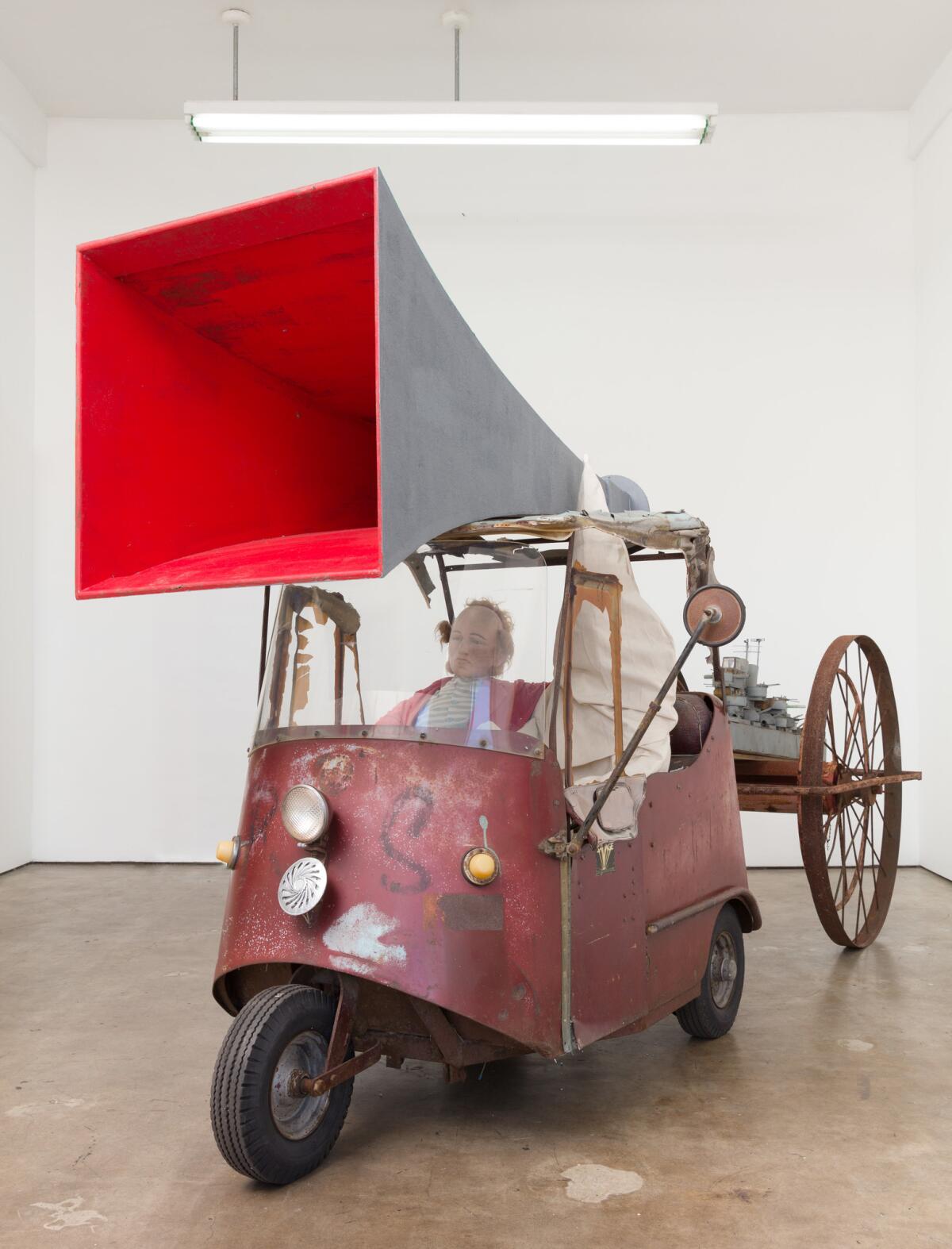Review: A Klansman with a megaphone: Steven Hull’s sordid art laments troubled times
- Share via
Steven Hull makes carnivalesque hybrids of painting and sculpture whose chief aim is to turn visions of the conventional world upside down. When that world has already been stood on its head, his art assumes an unexpected level of creepiness.
The centerpiece of his incisive show at Meliksetian Briggs, Hull’s debut with the gallery, puts white nationalism and its perversion of authentic Christian values on sordid display. An assemblage of ramshackle found objects, it features an old-fashioned motorized scooter — a vintage 1951 Electric Shopper — towing a model battleship that’s made from wood blocks, packing tubes and old sardine and tuna fish cans, all painted dull gray.
On the scooter’s roof, a big electric megaphone blares the rantings of a fire-and-brimstone country preacher. The hourlong recorded audio has been slowed to a deep, drunken-sounding bass, its garbled sermon periodically punctuated by alarming warnings of Lucifer’s seductions and wrath.
Driving the dilapidated scooter: a Klansman in a white robe and a frazzle-haired blond sidekick.

Stylistically, Hull’s trashy mannequins and their cracked demeanor cross Edward Kienholz sculptures, Philip Guston paintings and 19th century Thomas Nast editorial cartoons. Nast was the scourge of “Boss” Tweed and his post-Civil War corruption scandal around Tammany Hall, the New York Democratic political machine.
Hull’s sharp caricature uses history as a scaffolding for a scathing satire of American political life now. The target is underscored by assorted homemade bumper stickers on the Electric Shopper’s back end, together affirming the bigoted rhetoric of putative billionaire-President Trump.
The tableau’s wry title, “If Jesus Gives Us Everything We Want, We’ll Love Him,” zings prosperity theology, which holds that financial success is a function of appropriate worship. Nearby, a trash can sprouts a tattered tree of knowledge, while two wooden cracker-barrels are topped by a toy church and a toy carnival clown, respectively; each sculpture is paired with a big, brushy abstract painting.
The large canvases are of a kind that critic Clement Greenberg, writing in 1955, approvingly labeled as “American-Type Painting.” Hull flanks one with American and Confederate flags, and he slathers all three with slate-gray paint. Bits of bright color underneath are shrouded by the gathering storm.
This is the first half of “Sheets Deprived of Wind,” Hull’s two-part show for the small gallery space. I haven’t seen the second, which launches Saturday; but given the first, expect equally complex crosscurrents to form a sad, sinister, pitch-perfect lament for our troubled time.
Meliksetian Briggs, 313 N. Fairfax Ave., West Hollywood. Part I ends Friday; Part II runs Saturday to April 15. Closed Sundays and Mondays. (310) 625-7049; www.meliksetianbriggs.com
christopher.knight@latimes.com
Twitter: @KnightLAT
The biggest entertainment stories
Get our big stories about Hollywood, film, television, music, arts, culture and more right in your inbox as soon as they publish.
You may occasionally receive promotional content from the Los Angeles Times.








